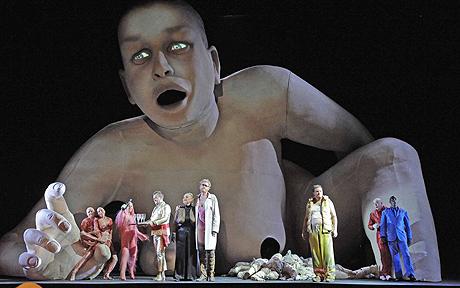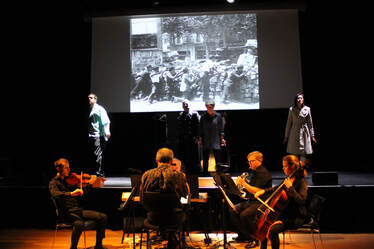|
Have had a wonderful variety of operatic experiences recently and, while I’m always interested in the insights that different productions can bring to a work, I can’t help but reflect chiefly on the quality of the music-making and, even more, on how the composer problem-solved, setting text and underlining a drama by means of the singing voice. While not denying the cast and creatives their credit, nothing can redeem a bad score - whereas a good score can suffer if justice isn’t done.
0 Comments
Attended a performance last night of Le Grand Macabre at the Barbican, London. An immensely good performance and riveting from start to finish. It was great to have the London Symphony Orchestra on stage, which meant we could relish the score's fabulous textures which bristled and shimmered and hooted and blasted and everything in between.
We recently celebrated Verdi's 200th birthday. I arranged a kind of party in Newbury, invited locals to Come, Sing or Listen, and Drink. I might well have added Eat, since a beautiful cake was made in his honour. Verdi's not my favourite composer - I don't think I have a real favourite anyway - but I wouldn't have wanted to organise this occasion for anyone else. Verdi's special. You don't have to be a revolutionary to write good music. You don't have to adopt a musical language which is up-to-the-minute, or even avant-garde. You just have to write good music. And in Verdi's case, he wrote in a style which is so much his own that you can't mistake it for anyone else. Once he gets into his stride, he doesn't imitate anyone else. And no other composer sounds like him. Therefore that makes him individual.
Compare him to Wagner. Everyone started writing like Wagner. And if Verdi's heir is Puccini-cum-Wagner - well, then everyone started writing like Puccini, and Hollywood still does! The late Romantic style is common currency, a sort of Esperanto of music, to be consumed globally like MacDonalds! Verdi - not so. A rock-solid individual. I must catch up with some more operatic experiences this year: there was Glass' A Perfect American, whose music was much less absorbing than that of Akhnaten or Satyagraha and whose subject was not very interesting. If Walt Disney had no redeeming qualities, how was the opera going to yield any insights into the human condition? Apart from an entertaining production, the work itself seemed pointless.
Lohengrin in Cardiff was visually depressing - a nineteenth century prison? - but the music won out in any case. Brought back many memories of one of my first tasks at the Royal Opera House when I joined the staff there: coaching the chorus was hampered by constant strikes in those medieval, pre-Thatcher times and it was touch-and-go whether the music could be learnt in time. No such worries with WNO - the chorus were spectacular and so were the cast and orchestra. The clarity and directness of the music when performed well like this are very refreshing in comparison to Wagner's later works. Wagner Dream by the late, great Jonathan Harvey was, unfortunately for me, impenetrable. Multi-layered, complex and very dissonant. The work was definitely not helped by having the main action spoken by actors, a disappointing decision since too much dialogue, here accompanied by the orchestra, simply shows up opera's weaknesses: better for the music to stop so you can concentrate on the dialogue and the acting. Or you could take the view that the spoken text pales in comparison to the sound of the singing voice - since, after all, we came for the music. Attended the European premiere of this work last night. Another masterpiece from the greatest living composer - and one of the greatest of all time.
Eventually caught up with The Minotaur at ROH last night. I would hardly call it a pleasurable experience. The opera threw all sorts of other great things at me in abundance; but sheer pleasure was not one of them. Most operas give pleasure and have done so for ages; I guess the relentless atonality - and the largely declamatory style of singing that goes with it - conspired to deprive me of, well, operatic rapture. Why should this be so? And does it matter anyway? It certainly held my attention - it was compelling, awesome you might say - so it must have succeeded. But it was like beholding a brutalist piece of modern architecture which you somehow feel has been built by architects for architects, rather than for ordinary people to enjoy and marvel at. You can't deny the originality or scale of achievement. But it doesn't give you much pleasure.
Can't help but compare The Minotaur with A Flowering Tree (written within a year or two of each other). I reckon AFT would be reckoned by most as quite a 'difficult' modern opera, and in fact it seems TM has received more performances. Both works are original and up-to-date and inventive. But AFT has an additional dimension: the beauty of sound and of singing. Recently caught up with the TV documentary Britten's Children. I want to question the values of purity and innocence which are so often quoted in connection with Britten's music. Why is some of his music considered pure? Some of it is indeed beautifully simple: he knows when to turn down the volume, when to stop writing notes and to let the words speak for themselves. But just because the music is song-like, or that children's voices are performing it, it doesn't necessarily follow that the music enters a realm of purity - to which other composers of all eras can only aspire! And for that matter, I don't buy into the notion of innocence either. Kids may be young and hopefully relatively care-free but they surely have strains and stresses - and tantrums! - like the rest of us. Just because someone isn't grown up (or may not have lost their virginity) doesn't mean to my mind that they're innocent, or in any kind of special blissful state: anymore than someone who is grown up (and experienced sexually) doesn't become 'guilty' or impure. I can't help feeling that in the background there's a lot of prudishness going on and, at the least, the view that innocence and purity are somehow wonderful involves looking at childhood through rose-tinted spectacles. Could this only happen in England?
Heiner Goebbels - this guy's music is so good, so individual; just listening to it again and it's going straight on my iPod. Check out Surrogate Cities and Landschaft mit entfernten Gewandten.
|
Edward LambertComposer and musician Categories
All
Archives
July 2024
|
|
Scores available by means of a Performance Restricted license from IMSLP
The Music Troupe
|
Contact Us |

 RSS Feed
RSS Feed
